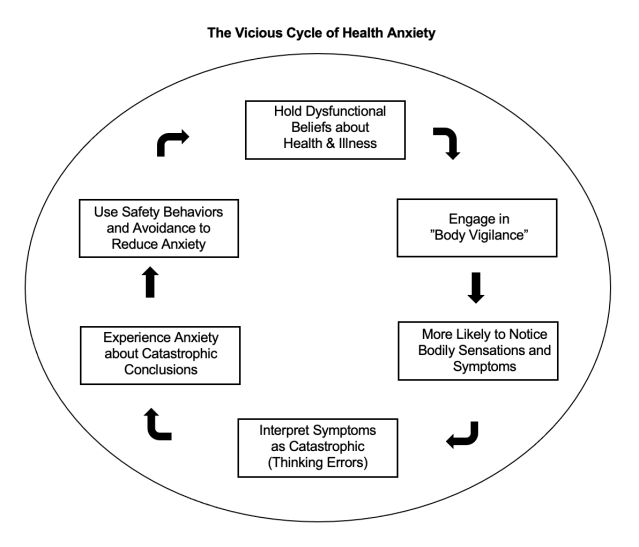Brittney Chesworth Ph.D., LCSW
Health anxiety is the excessive worry about becoming seriously ill. Health anxiety is associated with maladaptive thoughts, beliefs, and behaviors. If you have health anxiety, you know the routine. It can go a little something like this:
- You hold certain dysfunctional beliefs about health and illness (e.g., all bodily sensations and symptoms are due to underlying disease and/or are dangerous; serious disease is common; I am too weak to overcome a disease if I am diagnosed).
- You notice a symptom or bodily sensation.
- You begin to imagine different potential explanations, which typically spirals into a detailed worst-case scenario of some sort (I have cancer, I have MS, I have dementia; I won’t be able to function, I won’t be able to work; I will die, my children will be orphans).
- You need answers now so you get right to work to ensure there isn’t a dangerous disease behind this symptom (engage in avoidance or safety behaviors such as avoiding the doctor, Googling symptoms, seeking reassurance, going to the emergency room or urgent care, excessively checking body parts).
- Your loved ones, your doctor, and/or the internet reassure you that everything is OK.
- You feel relieved—yay!
- The relief fades—uncertainty about that last symptom creeps up again (or a new symptom emerges).
- All of this reinforces your dysfunctional beliefs, and you start the cycle all over again.
This is an example of the vicious cycle of health anxiety. See the diagram below. You can improve health anxiety by targeting each of the individual thoughts, beliefs, and behaviors that contribute to this cycle.

Improving thoughts, beliefs, and behaviors are all important in helping you to overcome your fear of disease. I am going to give you a brief breakdown of how cognitive behavioral therapy (CBT) therapists help people improve their health anxiety.
Understanding the cycle of health anxiety
It is essential that you understand how the things you think, believe, and do are allowing your health anxiety to thrive. Once you have the basic knowledge on how and why your thoughts, behaviors, and beliefs are problematic, we can help you to change the way you think and behave. But this knowledge is essential to have before we can begin our work.
Understanding the impact of “body vigilance” and the normalcy of “body noise”
It is important that you learn that hyperawareness of all bodily sensations and symptoms (a.k.a. “body vigilance”) makes you notice more symptoms and leads to unhelpful catastrophic conclusions about bodily sensations and symptoms that are harmless and benign. It is common for health-anxious people to assume that all bodily sensations are due to underlying disease. However, this isn’t true. All bodies are noisy, meaning that we have bodily sensations that are not due to underlying disease but are simply due to normal biological self-regulatory processes or anxiety.
Building thought awareness and cognitive restructuring skills to challenge thinking errors
It is critical to recognize the thoughts you have about your bodily sensations and symptoms. You need to learn to build awareness of your thought patterns. You also need to learn how to identify thinking errors, which are inaccurate or biased thoughts that make you more anxious about your health. You also need to learn how to challenge these problematic thoughts and learn how to think about health in more balanced, adaptive ways.
Reshaping dysfunctional core beliefs about health and illness
Once you have learned to challenge thinking errors and have developed solid cognitive restructuring skills, we want you to identify key core beliefs that are making your health anxiety worse. Examples are the overestimation of the probability of serious disease and the intolerance of uncertainty. Core beliefs are the driving force behind everything you do, so changing these beliefs is an essential step in the process.
Preventing the use of safety behaviors and avoidance
You likely engage in a lot of safety behaviors or avoidance when you are anxious about your health. You do this to reduce the anxiety you feel about your health. However, although they might reduce anxiety in the moment, they ultimately increase anxiety over the long term. This is because you believe you need to do these things to be safe and ensure good health. So, ultimately, these behaviors only further reinforce your dysfunctional beliefs about health. To help you learn how to not use these behaviors, we have you complete exposure tasks in which you face feared situations while preventing yourself from using these behaviors. Over time, you will become less reliant on them.
Taking this information to help you find what you need
There you have it! This is an oversimplified explanation of how you can use CBT to improve health anxiety. If you are seeking therapy for health anxiety and would like to try CBT, I hope this information is helpful in that it gives you a glimpse of what it can look like. When meeting with potential new therapists, ask them whether they use these techniques to help people improve health anxiety.
It takes time and effort, but it is well worth it. I have seen some clients improve their health anxiety in just a couple of months. Of course, these clients were extremely diligent in putting in the hard work to change their thoughts, beliefs, and behaviors. You can do it too!
